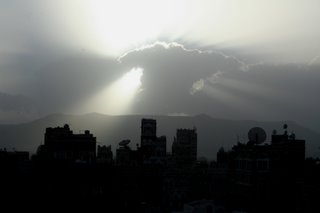The infamous Arabic satellite news channel, Al Jazeera, launched its English language service today to an estimated 80 million homes around the world. Its aim, its director-general says, is to try to reverse the flow of information which currently runs from north to south. It will be interesting to see what effect it has on other broadcasters’ coverage of international news.
Like the BBC, Al Jazeera – ‘The Island’ in Arabic – has made a virtue of its impartiality. As anyone who has visited the Arab world will know, the enormous, rusty satellite dishes on almost every roof testify to a yearning everywhere for independent news which is not satisfied by the turgid daily gobbets from government news outlets. See this scintillating item from the official Syrian news agency, SANA, today if you remain to be convinced.
As the BBC cuts back its short wave radio World Service – and weirdly hopes that its audience around the world can tune in via the internet – there may well be space for Al Jazeera. But whether it can cover the world as it claims it wants to “from the south”, will all boil down to budget. I saw Jon Snow, the journalist and Channel 4 News anchor, speak last year on just this subject, and he reminded the audience that it is far cheaper to broadcast live from the USA than it is to commission a report from Darfur, say, in western Sudan, where there is a genocide going largely unreported. The worst example of the consequences of this, the one that made my blood boil, was the way in which the BBC devoted an entire half-hour evening news bulletin to the verdicts in the Michael Jackson trial in June last year.
Perhaps Al Jazeera will force the BBC to follow more expensive foreign stories. I hope so. But in these cash-strapped times, the frequently trivial rubbish breaking in the developed world looks likely to continue to trump those genuine news stories emerging from the more dangerous and remote elsewhere.




No comments:
Post a Comment